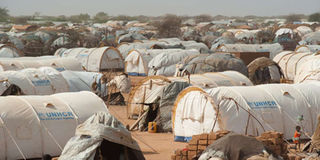Garissa residents block UNHCR offices in Dadaab over refugees

Tents in Dadaab refugee complex on July 24, 2011. Some Garissa residents blocked the UNHCR offices in Dadaab on November 30, 2017 as they protested against environmental degradation by refugees in the Dadaab camps and possible loss of jobs by locals, following reduced funding for refugees. PHOTO | PHIL MOORE | AFP
What you need to know:
- The host community claimed the refugees have depleted environment as a results of charcoal burning, poaching and cutting down trees and there was no clear communication on whether the United Nations High Commissioner for Refugees would compensate them.
- They also protested against the move to sack local staffers over reduced funding. They said the refugee agency should instead reduce the number of foreign workers.
Operations in the expansive Dadaab refugee camps was paralysed for the second day on Thursday following demonstrations by the host community, which is seeking to have various issues addressed.
Hundreds of residents carrying placards lit bonfires at the main gate of Dadaab-based UNHCR and its agencies’ headquarters, blocking vehicles going out for operations in the camps.
PROTESTS
Angry protesters also turned away NGOs trying to access the extensive UNHCR-controlled offices while carrying twigs and singing anti-UNHCR slogans as contingents of security officers watched from a distance.
The host community claimed the refugees have depleted environment as a results of charcoal burning, poaching and cutting down trees and there was no clear communication on whether the United Nations High Commissioner for Refugees (UNHCR) would compensate them.
"We are protesting because we want UNHCR to move out of Dadaab and take refugees elsewhere because they have brought much suffering to the host community for the last 26 years. As pastoralists, our livestock have nowhere to graze due to depletion. There have been no benefits or compensation whatsoever," said Nasibo Abdi Farah.
IGNORED
Ms Farah claimed UNHCR and other development partners have been overlooking the host community when hiring, saying most of its employees are either foreign staff or Kenyans from other parts of the country.
She said UNHCR has also given a notice of termination of employment for more than 100 youth from the host community and they would be axed next month.
The locals are also protesting the slashing of funds to local community-based organisations – Fafi Integrated Development Associations (FaiDA) and Relief, Reconstruction and Development Organisation (RRDO), both based in Dadaab.
"UNHCR supplies gas and kerosene to other refugee camps but Dadaab Refugee Camps, which are one of the biggest camps, are still using firewood as a source of energy. UNHCR must bring immediate alternative sources of energy for the refugees. We cannot allow this to continue beyond such a magnitude," said Mr Abdikadir Aden, an environmentalist.
FOREIGN WORKERS
Idriss Garat said the refugees’ agency claims it is laying off staff because its funds have been reduced, but it should let the locals have jobs and reduce the number of international staff, who earn more.
"We have been generous; we have hosted refugees for the last 26 years but this has come with grave consequences that now needs immediate intervention," he said.
Addressing journalists at his office Dadaab Deputy County Commissioner Mr Harun Kamau said UNHCR and the host community have never had any problems but current squabbles have been as a results of reduced number refugees because of repatriations, this has also affected operations and funding by UNHCR.
REFUGEES
On November 10, 2013, Kenya, Somalia and UNHCR signed a tripartite agreement for the voluntary repatriation of Somali refugees. Since then, a number of refugees have gone back to Somalia.
"The number of refugees have reduced to almost a half because in 2011 they were about 470,000 while currently they are about 230,000 that means workload for UNHCR also reduces as well as funding. This may result in layoff of staff," he said.
The Dadaab administrator, however, said they have been meeting with both the host community and the UN refugee agency and hope solutions will be found soon.
Mr Kamau acknowledged that the environment has been degraded over the years the refugee camp has been opened and it could take years to restore it.
When contacted by the Nation, UNHCR said they would give comment after it has notified the government.





